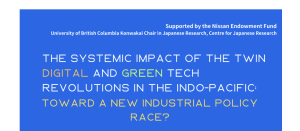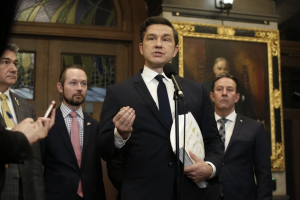Op-ed: Prof. Yves Tiberghien says Taiwan’s election shows remarkable political resiliency
Despite external pressures from China, the Taiwan elected results were stable and as predicted. The DPP won the presidency but lost control of the legislature. The results show a degree of resilience and self-confidence of the Taiwanese in their democratic system, while also suggesting continuous caution and a preference for stability.
Prof. Yves Tiberghien investigates if South Korea has a grand strategy
Professor Yves Tiberghien and colleagues conclude that South Korea, and by extension other middle powers, can develop their own grand strategy. The finding that South Korea has a grand strategy is significant because it implies long term strategic thinking and planning remains posible for countries.
Prof. Yves Tiberghien examines the systemic impact of digital and green technology revolutions in the Indio-Pacific
Professor Yves Tiberghien and colleagues explore how together the digital and green technology revolutions are driving future growth, transforming employment and societies, and reshaping the global economy in their new working paper. These transformations are reshuffling the liberal global order and changing power relations.
Op-ed: “Taiwan’s democracy triumphs” says Prof. Yves Tiberghien
The victory of the Democratic Progressive Party in Taiwan, despite economic and geopolitical pressures, showcases a balanced electorate with a divided government between the presidency and parliament, resilient democratic institutions and voters, and a focus on domestic issues over security and cross-strait relations.
Op-ed: “Taiwan’s Democracy Has Shown Great Resilience in 2024” says Prof. Yves Tiberghien
Professor Yves Tiberghien says the Democratic Progressive Party’s re-election, despite reports of election and media interference by China, shows that Taiwanese voters and institutions are building resilience to foreign election risks.
Prof. Kathryn Harrison says the carbon tax is needed to reach emissions targets
Professor Kathryn Harrison explains that Canada is on track to miss its 2030 emissions goal. Replacing the carbon tax and still achieving the target would be extremely difficult, given how slow regulation is.
Prof. Kathryn Harrison discusses the Carbon Tax as a financial incentive
Professor Kathryn Harrison says the carbon tax is meant to financially incentivise people to reduce their emissions. Regardless of personal consumption, everyone receives the same rebate. While imperfect, no better solution has been proposed.
Prof. Stewart Prest warns against relying on a single poll
Professor Stewart Prest says the recent poll showing “broad dissatisfaction” with the B.C. NDP government in several policy areas is “bad news” for both the NDP and B.C. United. However, the opposition’s vote remains divided, limiting its impact.
Global History of Anticolonial Thought Cluster receives Catalyzing Research Clusters Grant
The cluster is led by Prof. Barbara Arneil and includes Profs. Glen Coulthard, Nazmul Sultan, Afsoun Afsah, and Anna Jurkevics.
Prof. Michael Byers delivers Green College’s 2024 Richard V. Ericson Lecture on March 6
In this time of multiple global crises, international law is being invoked more than ever before, raising numerous questions. An understanding of the role of international law in global crises can help us to understand international politics, find paths toward cooperation and see reasons for hope.








